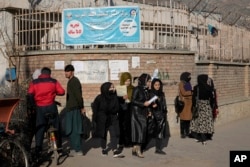The Canadian government might have a lot of disagreements with the Taliban leadership in Afghanistan but it is reviewing Canada’s counterterrorism laws to find ways to help people under Taliban rule.
Canada has designated the Taliban a terrorist entity, prohibiting Canadian citizens and organizations from all transactions with Taliban individuals, processes and institutions.
More than a dozen Canadian non-governmental organizations have called on Ottawa to carve out humanitarian exceptions for them, so they can continue to operate in Afghanistan.
“Canadian humanitarian and development agencies have operated in Afghanistan for decades and must be allowed to continue carrying out essential operations,” the NGOs said in an open letter.
Canada pledged $143 million to the U.N. system to fund humanitarian operations for Afghans inside and outside Afghanistan. A major donor to Afghanistan, Canada spent more than $3.8 billion on development and humanitarian activities in Afghanistan between 2002 and 2021, but immediately stopped all development assistance after the Taliban seized power in August 2021.
“Departments from across the government of Canada are seized with this issue and are working to identify a solution that upholds Canada's national security interests, while facilitating the effective delivery of assistance to the Afghan people in this unprecedented situation,” Genevieve Tremblay, a spokesperson for Canada’s International Development Agency, told VOA.
Ottawa is not interested in taking the Taliban off its terrorism list. The action is rather prompted by calls from aid agencies for an urgent response to the humanitarian crisis in Afghanistan.
“Canada remains deeply concerned about the continuing humanitarian crisis in Afghanistan and we will continue to do all that we can to support the Afghan people,” said Tremblay.
On Tuesday, U.N. emergency relief coordinator Martin Griffiths told the Security Council that 97% of the people in Afghanistan live in poverty and two-thirds need urgent humanitarian assistance for survival.
“We face a daunting financial challenge as we enter 2023. We need $4.6 billion to adequately address the country’s humanitarian needs,” Griffiths said.
Feminist policy
In addition to its terrorism-related legal restrictions, Canada’s feminist international development policy also appears at odds with a Taliban-run Afghanistan, where women have been deprived of education, work and many other freedoms.
This week the Taliban closed all private and public universities to women, a move globally condemned as misogynistic.
Aid workers say the Taliban also interfere with and restrict humanitarian operations in Afghanistan, particularly for women.
“Female humanitarian workers face harassment, intimidation and mistreatment on a daily basis,” the U.N. reported in September.
Canada has prioritized women in its Feminist International Assistance Policy and requires its funded partners to integrate gender-based programming into all their programs.
“These decisions were made very strategically,” Paras told VOA “to empower women around the world but also to trademark Canada’s identity as a donor.”
US example
This week, the U.S. government announced it is relaxing some sanctions on the Taliban to help aid agencies deliver essential humanitarian assistance to Afghanistan.
“Today we are making an important update to U.S. sanctions. Our updated general licenses across U.S. sanctions programs will make it easier to deliver life-saving aid to those in need while ensuring sanctions target those threatening peace, security, and stability,” Antony Blinken, U.S. secretary of state, tweeted on Tuesday.
The U.S. has committed over $1 billion in humanitarian assistance to Afghanistan over the last year, making Washington the top donor to the famine-hit country.
While commending U.S. funding, aid agencies say Washington’s strict economic sanctions have inhibited humanitarian response operations and have exacerbated economic hardships for many Afghans.
The U.S. humanitarian waivers will encourage Canada to ease its own sanctions and allow Canadian aid to reach needy Afghans, Paras said.
“We in Canada tag along with our bigger cousin across the border,” she said.






